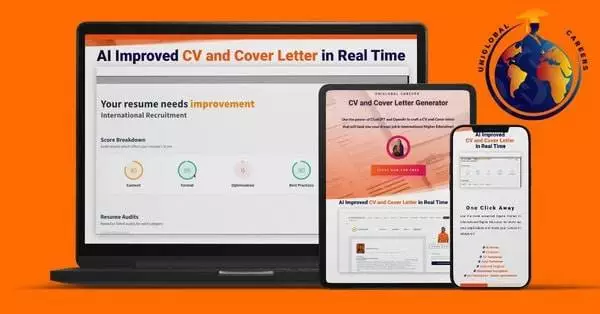In today’s highly competitive job market, crafting a compelling cover letter is crucial to securing your dream job in the field of international education. With the advancements in technology, specifically Artificial Intelligence (AI), job applicants now have access to powerful tools that can help them enhance their cover letters and stand out from the crowd. In this article, we will explore the role of AI in job applications, the importance of a strong cover letter in international education, how to effectively use AI tools to improve your cover letter, real-life success stories, potential pitfalls, and tips to ensure authenticity in your AI-enhanced cover letter.
Understanding the Role of AI in Job Applications
AI has revolutionized various aspects of our lives, and the job application process is no exception. Over the years, AI has evolved and become an integral part of the job market. The increasing use of AI tools and algorithms has transformed the way organizations screen and evaluate potential candidates.
Previously, recruiters would manually review hundreds of cover letters and resumes, which was a time-consuming process. However, with the advent of AI, these initial screening processes have become more efficient and accurate. AI tools can analyze cover letters and identify relevant keywords, experience, and skills, allowing recruiters to focus on the most qualified candidates.
But how exactly has AI evolved in the job market? Let’s take a closer look.
The Evolution of AI in the Job Market
AI has come a long way in the job market. Initially, it was primarily used for automating repetitive tasks, such as resume screening and candidate matching. However, with advancements in Natural Language Processing (NLP) and machine learning, AI can now analyze and interpret the content of cover letters with a higher degree of accuracy.
Modern AI tools can assess the overall quality, tone, and structure of a cover letter. They can provide valuable insights and suggestions for improvement, enabling applicants to tailor their letters to meet the specific requirements of the international education job market.
Imagine a scenario where an applicant has written a cover letter for a teaching position. With the help of AI, the tool can analyze the letter and provide feedback on the applicant’s teaching experience, highlighting any relevant certifications or achievements that may have been overlooked. This not only saves time for the applicant but also ensures that recruiters receive well-crafted and tailored cover letters.
How AI is Changing the Job Application Process
The integration of AI in the job application process has both advantages and challenges. On the positive side, AI tools can save time for both applicants and recruiters. By automating the initial screening process, organizations can quickly shortlist qualified candidates, while applicants receive feedback and guidance on how to improve their cover letters.
Moreover, AI can help eliminate bias in the hiring process. Human recruiters may unintentionally introduce bias based on factors such as gender, race, or educational background. AI tools, on the other hand, rely solely on objective criteria, ensuring a fair and unbiased evaluation of candidates.
However, it is essential to strike a balance between AI and human involvement in the hiring process. While AI can efficiently analyze data and highlight relevant information, it lacks the human touch and intuition. Ultimately, the final hiring decision should consider the expertise and judgment of human recruiters.
Furthermore, the use of AI in job applications raises concerns about data privacy and security. Applicants may worry about the confidentiality of their personal information and how it is stored and used by AI systems. Organizations must prioritize data protection and ensure that applicants’ information is handled responsibly and in compliance with relevant privacy regulations.
In conclusion, AI has significantly transformed the job application process, making it more efficient and accurate. From automating initial screenings to providing valuable feedback, AI tools have proven to be valuable assets for both applicants and recruiters. However, it is crucial to strike the right balance between AI and human involvement to ensure a fair and unbiased hiring process.
The Importance of a Strong Cover Letter in International Education
A strong cover letter is crucial in the field of international education as it allows you to showcase your passion, qualifications, and suitability for the role. It serves as an introduction and helps employers understand why you are the ideal candidate for the position.
When applying for a job in international education, your cover letter plays a vital role in making a lasting impression on potential employers. It is your chance to convey your enthusiasm for working in this field and demonstrate your understanding of its unique challenges and opportunities.
One key element to consider when crafting your cover letter is addressing it to the appropriate person or department. Taking the time to research the organization and personalize your letter shows your genuine interest in the role and the institution. It also reflects your attention to detail and professionalism.
Furthermore, clearly stating your qualifications, relevant experience, and accomplishments can help capture the attention of the employer. In the field of international education, employers are looking for candidates who not only possess the necessary skills but also have a proven track record of success in working with diverse populations.
It is important to align your skills with the requirements of the international education field and emphasize your ability to work effectively in a multicultural environment. Highlighting your cross-cultural communication skills, adaptability, and knowledge of different educational systems can make your cover letter stand out.
Understanding the International Education Job Market
The international education job market is highly competitive and constantly evolving. To succeed in this field, it is crucial to have a deep understanding of the industry trends, challenges, and opportunities.
Staying informed about the latest developments in international education can give you a competitive edge. This knowledge can be reflected in your cover letter, where you can discuss your awareness of current issues and your ideas for addressing them. Employers are looking for candidates who can contribute to the growth and advancement of international education.
In addition to keeping up with industry trends, it is also important to tailor your cover letter to showcase your knowledge and adaptability. Employers want to see that you have a global mindset and can navigate the complexities of working in a multicultural environment. Highlighting your experiences studying, volunteering, or working abroad can demonstrate your ability to thrive in diverse settings.
In conclusion, a strong cover letter is essential in the field of international education. It allows you to convey your passion, qualifications, and suitability for the role while demonstrating your understanding of the industry. By addressing key elements and showcasing your knowledge and adaptability, you can increase your chances of success in this competitive job market.
How to Use AI Tools to Improve Your Cover Letter
Now that we understand the importance of a strong cover letter in international education, let’s explore how AI tools can enhance the quality and impact of your application.
A well-crafted cover letter can be the key to standing out among other applicants and securing your dream job in the field of international education. With the advancement of technology, AI tools have emerged as valuable resources that can help you improve your cover letter in various ways.

Choosing the Right AI Tool for Your Needs
There are numerous AI tools available in the market, each offering unique features and functionalities. When selecting an AI tool, it is crucial to consider your specific needs and requirements.
Some tools focus on grammar and language correction, ensuring that your cover letter is free from any errors or typos. These tools can help you maintain a professional and polished writing style throughout your document.
On the other hand, there are AI tools that provide suggestions for content improvement. They analyze your cover letter and offer insights on how to make it more engaging, persuasive, and tailored to the specific requirements of the job you are applying for.
It is recommended to read reviews, explore trial versions, or seek recommendations from professionals in the field to ensure you choose a reliable and effective AI tool.
Step-by-Step Guide to Using AI for Cover Letter Improvement
Once you have chosen the right AI tool, follow these steps to effectively use it for improving your cover letter:
- Copy and paste your cover letter into the AI tool’s platform.
- Allow the tool to analyze your cover letter thoroughly. The AI algorithms will scrutinize your writing, identifying areas that can be enhanced.
- Review the tool’s suggestions for grammar, vocabulary, and overall structure. AI tools often provide detailed feedback, highlighting specific sentences or paragraphs that could be improved.
- Make necessary revisions and edits based on the tool’s recommendations. This could involve rephrasing certain sentences, using more impactful vocabulary, or restructuring the flow of your cover letter.
- Proofread your cover letter to ensure coherence and clarity. While AI tools can provide valuable suggestions, it is important to have a human eye review your final document to catch any remaining errors or inconsistencies.
By following these steps, you can leverage the power of AI to enhance your cover letter and make it more impactful. Remember, AI tools are meant to assist you in the writing process, but ultimately, the content and personal touch should come from you.
Furthermore, it is essential to strike a balance between utilizing AI tools and maintaining your own unique voice and style. While AI can offer valuable suggestions and improvements, it is important to ensure that your cover letter remains authentic and reflects your personality and qualifications.
With the right AI tool and a thoughtful approach, you can create a compelling cover letter that captures the attention of recruiters and increases your chances of securing your desired position in the field of international education.
Case Studies: Success Stories of AI-Enhanced Cover Letters
Real-life success stories serve as inspiration and provide valuable insights into the effectiveness of AI-enhanced cover letters in securing jobs in international education.
How AI Helped John Secure a Job in International Education
John, a recent graduate in International Relations, was struggling to craft a compelling cover letter while applying for international education roles. With the help of an AI tool, John was able to identify areas of improvement and transform his cover letter into an engaging narrative that highlighted his passion for multiculturalism and his ability to adapt to diverse environments. The AI tool’s suggestions for structure and content played a crucial role in securing John an interview and eventually landing his dream job.
Sarah’s Experience: From a Basic Cover Letter to an AI-Enhanced One
When Sarah decided to pursue a career in international education, she faced fierce competition from experienced candidates. Sarah relied on an AI tool to enhance her basic cover letter and make it stand out. The tool’s suggestions for specific language and highlighting her cross-cultural experiences significantly improved the impact of her application. Sarah attributes her success in securing multiple interview invitations to the support and guidance provided by the AI tool.
Potential Pitfalls and How to Avoid Them
While AI tools can be powerful allies in improving your cover letter, it is crucial to be aware of potential pitfalls and take necessary precautions.

Common Mistakes When Using AI Tools
One common mistake is relying solely on AI tools without applying critical thinking. AI tools provide suggestions, but it is essential to review and consider their recommendations in the context of your specific situation and the requirements of the international education job market.
Additionally, being overly reliant on AI tools can lead to a lack of authenticity and personal touch in your cover letter. Remember, AI tools are meant to enhance your letter, not replace your unique voice and experiences.
Tips to Ensure Authenticity in Your AI-Enhanced Cover Letter
To ensure authenticity in your AI-enhanced cover letter, consider the following tips:
- Review the tool’s suggestions critically and tailor them to reflect your personal experiences and achievements.
- Include specific examples and anecdotes that highlight your unique qualifications and suitability for the international education field.
- Proofread your cover letter carefully to ensure it remains coherent and reflects your voice.
- Seek feedback from trusted peers or professionals in the field to ensure your cover letter remains authentic.
By following these tips, you can leverage the benefits of AI tools while maintaining the authenticity and impact of your cover letter.
In conclusion, AI tools can be valuable assets in enhancing your cover letter for a job in international education. By understanding the role of AI in job applications, recognizing the importance of a strong cover letter, and effectively using AI tools, you can significantly improve your chances of securing your dream job. However, it is vital to be aware of potential pitfalls and maintain authenticity throughout the process. With the right balance between AI and human involvement, you can create a compelling cover letter that showcases your passion, skills, and suitability for the international education field.


